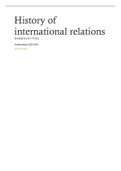Summary
Summary Hsitory of International Relations
- Course
- Institution
Summary about the History of International Relations course. All information from the PowerPoints, notes (from each lesson), summary of the texts, notes from the handbook and a number of exam questions. Point achieved by studying only this summary: 16/20
[Show more]



